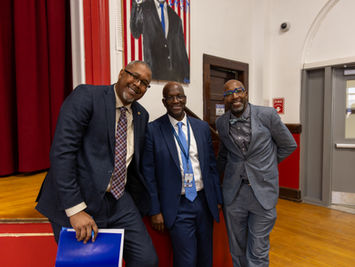top of page
PRIORITIZING OUR COMMUNITY NEEDS
Our Ongoing Initiatives
Our work is anchored by these long-term projects :
Early Childhood
Early Childhood
Ideas in Action
From prenatal development through a child’s entry into kindergarten, the brain makes billions of neural connections that form the foundation for lifelong learning. By age five, 90% of a child’s brain growth has already occurred—making the early years a period of profound opportunity. Children who experience consistent care, nurturing relationships, and rich learning environments in these early years are far more likely to succeed in school and thrive as adults.
For too many young children in Poughkeepsie, fragmented systems and limited access to affordable, high-quality early learning spaces create barriers to that success. Families face challenges finding coordinated care, literacy-rich environments, and social supports that build strong emotional and cognitive foundations.
The Poughkeepsie Children’s Cabinet is working to change this reality by partnering with parents, early educators, policymakers, and community organizations to ensure every child in Poughkeepsie enters kindergarten ready to learn and thrive. Our early childhood strategy focuses on two key goals: expanding Access to Quality Care and strengthening Social-Emotional and Cognitive Readiness for kindergarten.
As a member of the Dutchess County Early Childhood Coalition, convened by the Dutchess County Workforce Investment Board, the Cabinet is part of a county-wide effort to connect early learning to workforce development. The Coalition’s Early Childhood Accord brings together local government, social services, higher education, and the business community to achieve three shared commitments:
-
A universal system of care where every child in Dutchess County has access to a high-quality early learning space;
-
A trained and supported pipeline of early learning professionals; and
-
Competitive compensation that allows early childhood educators to build long-term, sustainable careers.
We have seen progress thanks to the leadership of early care providers throughout the City and efforts by the Poughkeepsie City School District to expand full-day UPK. Between 2020 and 2023, the number of early childhood education seats for ages 0-5 increased 110%, from 455 to 956 seats.
To improve kindergarten readiness, the Cabinet supports families as their children’s first teachers—creating opportunities for joy, connection, and early literacy. Through our Bright Roads initiative with the Poughkeepsie City School District, community members are trained to engage caregivers in “The Basics”—five evidence-based principles that promote healthy development. Families receive twice-weekly text messages reinforcing simple, everyday practices that strengthen early learning.
Additionally, the Cabinet incubated Ampact Early Learning Corps, an evidence-based, high-dosage tutoring program launched in Poughkeepsie in 2023 after a successful planning period that included parents, teachers, district staff, and community leaders. Locally recruited AmeriCorps tutors are now embedded in Poughkeepsie City School District classrooms and community-based Universal Pre-K programs, providing individualized support to preschoolers while building meaningful career pathways for residents to enter and advance in the early childhood workforce.
Out of School Time
Ideas in Action
Out-of-School Time
Children spend 80% of their waking hours outside the classroom— a reality that underscores both the profound opportunity and urgent responsibility to ensure these hours are filled with high-quality learning experiences, supportive relationships, and meaningful engagement. By sixth grade, middle-class children have spent an average of 6,000 more hours in enrichment activities than their low-income peers, a gap that profoundly shapes educational outcomes and life trajectories.
In Poughkeepsie, these stakes are particularly high. Before the pandemic, only 29% of students were enrolled in district-sponsored afterschool programs, a number that dropped to just 10% by Fall 2021. For a district where 84% of students are economically disadvantaged and only 22% are proficient in English Language Arts, the need for coordinated, high-quality out-of-school time (OST) programming is not just urgent, it is essential to creating pathways to success.
The Poughkeepsie Children's Cabinet is transforming this reality by working with schools, youth-serving organizations, and families to build a citywide OST ecosystem rooted in two key goals: expanding access to quality programming and strengthening program quality through evidence-based assessment and continuous improvement. Our ambitious target is to expand five-day-per-week afterschool programming from 160 current seats to a minimum of 1,275 seats by the end of 2027, reaching 650 elementary students in grades 1-5, 300 middle school students in grades 6-8, and 325 high school students in grades 9-12.
Our strategy brings together six core OST providers including: Boys & Girls Club of Poughkeepsie, The Art Effect, Ampact, Community Matters 2, Nubian Directions II, and Family Services, along with youth services leaders from the City of Poughkeepsie, Dutchess County, and the School District to pilot initiatives creating shared quality standards, aligned data practices, and coordinated citywide financing. Building on this foundation, the Cabinet launched its second cohort of organizations in 2025 to provide intensive technical assistance and professional development to up to 10 additional youth development organizations serving Poughkeepsie. This capacity-building initiative equips emerging providers with essential skills in government contracting, program quality assessment, data tracking, and emergency preparedness, strengthening the entire OST ecosystem's ability to deliver safe, effective programming across the city.
Building Quality Through Evidence-Based Practice
Quality in out-of-school time programming isn't just about keeping youth busy, it's about creating the conditions that lead to measurable improvements in academic achievement, social-emotional development, and long-term success. The Poughkeepsie Children's Cabinet is providing training to local organizations to implement the Youth Program Quality Improvement, an evidence-based framework proven to improve program quality and youth outcomes across hundreds of communities nationwide.
With this approach, OST providers track program growth across four key domains: safe environment, supportive environment, interactive environment, and engaging environment. Staff then receive individualized coaching, participate in professional learning communities, and create tailored action plans to strengthen their practice. This approach recognizes that "Quality without Equity isn't really Quality," emphasizing that program quality must be culturally responsive and accessible to all youth.
This collaborative approach has built trust and created a shared commitment to continuous improvement, ensuring that enhanced out-of-school learning experiences translate directly to improved classroom performance and academic success.
Northside Initiative
Northside Initiative
Ideas in Action
Early in the Poughkeepsie Children’s Cabinet’s visioning process, it was clear that while our work would be citywide and benefit all Poughkeepsie youth, the Northside would serve as a focal point for our most targeted initiatives. Youth growing up in the Northside experience some of the lowest socioeconomic mobility rates in the nation. Child poverty rates reach as high as 49% in some census tracts, compared to 14% on the Southside of Poughkeepsie.
Stable housing is the foundation of a child’s cradle-to-career journey. When families have a safe and consistent place to call home, children can form strong early attachments, attend school regularly, and focus on learning instead of uncertainty. Housing stability supports not only academic success but also the physical and emotional well-being that carry youth into adulthood.
Equally important is the creation of mixed-income housing, where families from diverse economic backgrounds share neighborhoods, schools, and community spaces. These environments foster opportunity, connection, and mutual investment, which allows children to grow up surrounded by role models, resources, and trust. Mixed-income communities also tend to attract stronger local businesses, more responsive public services, and greater civic engagement, all of which contribute to the thriving neighborhoods every child deserves. In Poughkeepsie, expanding access to both stable and inclusive housing helps ensure that every young person can learn, grow, and ultimately return home to a community that continues to flourish.
The Poughkeepsie Children’s Cabinet believes that cross-sector partnerships are essential to building thriving communities and supporting the creation of affordable housing within mixed-income neighborhoods. To advance this goal, the Cabinet serves as a key partner in the City of Poughkeepsie’s Choice Neighborhood Initiative, a HUD-funded planning effort led by the City to revitalize the Northside through community-driven housing and economic development. The Choice process is rooted in one powerful idea: that residents themselves must be fully engaged in the creation of a new, vibrant vision for their neighborhood—one that reflects the pride, history, and aspirations of the Northside community.
Policy Advocacy
Ideas in Action
Policy Advocacy
Strong policy, paired with committed leadership to ensure implementation, is the heart of sustainable and transformative change for youth. The Poughkeepsie Children’s Cabinet believes that achieving our North Star goal requires shifting the underlying conditions for youth and family success, not just addressing immediate needs. That means pursuing policy change in local, state, and federal spaces, and ensuring that practice at every level removes barriers and builds strong pathways to stable housing, food security, thriving-wage jobs, and fulfilling lives.
Our approach starts with community-sourced research, grounded in the local experiences and knowledge of Poughkeepsie residents. We work to clearly define “what we are trying to solve,” and then draw on the expertise of our national place-based partners such as Harvard’s EdRedesign Lab, StriveTogether, the William Julius Wilson Institute at Harlem Children’s Zone, Purpose Built Communities, and the Children’s Funding Project to identify proven strategies from across the country that can be adapted for our community.
This approach has guided the Cabinet since its earliest days. Our initial Working Group Reports advanced specific policy recommendations in out-of-school and early childhood education, and our collaboration with the City of Poughkeepsie helped establish the first-ever Department of Youth Services within city government in 2023.
Our policy work continued through strategic public financing efforts in collaboration with local youth development providers who shared both existing programming costs and what elements they believed were necessary programmatic additions to serve youth at the highest quality. The Cabinet then determined the true level of investment required to build a citywide out-of-school ecosystem. Using this data, the Poughkeepsie City School District successfully advanced a voter-approved budget proposal expanding extended learning opportunities from three to five days per week for students through Grade 5, exemplifying evidence-based, community-informed policy leading to real change.
We continue to develop new ways to understand the needs of children, youth, and parents; propose sustainable policy solutions; and act as a hands-on implementation partner ensuring ideas become action.
Advancing Statewide Impact
The Poughkeepsie Children’s Cabinet is also a founding member of the New York State Place-Based Policy Coalition, a cross-regional alliance uniting communities from Buffalo to Brownsville. The Coalition’s mission is to align community-focused advocacy and capacity-building efforts that create clear pathways for children, from cradle to career, anchored in health, safety, and education that lead to economic mobility.
The NYS Place-Based Coalition elevates the importance of local leadership, data-driven decision making, and fully funded programs that meet the unique needs of every New York child. Supported by national partners and informed by place-based collaboratives across urban, suburban, and rural regions, the Coalition is working to build a statewide policy agenda that:
-
Unlocks state programmatic funding in community-specific ways
-
Increases local utilization of existing state programs
-
Ensures that critical supports families depend on are sustained and strengthened over time
Together, we are proving that policy works best when it is rooted in place—when it grows from the ground up, guided by those closest to the children and families it seeks to serve.
Join Us !
Discover our strategy & impact
Explore our interactive dashboard

Support youth through partnership or volunteering
Your financial support is essential to our mission
bottom of page





































